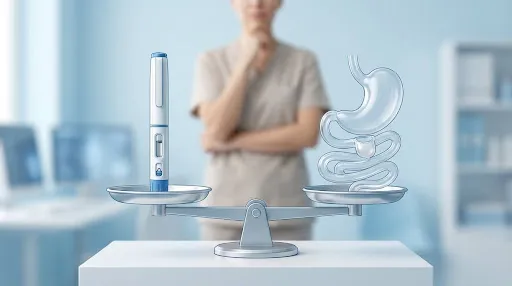Ever wondered why you feel tired even after sleeping enough? Or why do your muscles cramp when you're not even exercising? One answer might be your magnesium levels.
People often ask, “What is Magnesium Glycinate used for?” The answer is several. It touches nerve function, muscle repair, heart rhythm, mood regulation, and even insulin activity. That’s why it’s often a go-to for folks with diabetes, IBS, or even burnout from daily stress.
That’s where Magnesium Glycinate 500mg steps in. It’s one of the most absorbable, easy-on-the-gut forms of this mineral, and it does more than just fix a deficiency.
If you’ve been searching for how Magnesium Glycinate supplement helps with sleep, anxiety, heart rhythm, or cramps, you’re in the right place. Let's explore everything you need to know in detail.
What is Magnesium Glycinate 500mg, and Why Does It Work
Magnesium Glycinate is a chelated form of magnesium. That means it's magnesium bound to glycine, an amino acid. This combo is known for better absorption, gentler digestion, and fewer laxative effects.
Other forms, like magnesium oxide, don’t absorb well and often upset the stomach. Magnesium Glycinate supplement avoids all that. It's usually taken as a dietary magnesium supplement, especially by those with gut conditions, anxiety, sleep issues, or long-term stress.
In the U.S., many adults don’t get enough magnesium through food alone. While the Recommended Dietary Allowance (RDA) ranges between 300–420 mg/day, studies show that magnesium intake between 500 mg and 1000 mg daily may reduce blood pressure modestly, suggesting it plays a role in cardiovascular health too.
5 Amazing Magnesium Glycinate Tablet Benefits You Should Know
Many people first try Magnesium Glycinate because of one concern, then realize it helps in other areas too. Let’s break it down.
1. Supports Anxiety and Mood Stability
Magnesium Glycinate for anxiety works by affecting NMDA receptors and calming neurotransmitters like GABA. Studies show that magnesium has a stabilizing effect on brain function. Some users feel calmer within a few weeks of use.
2. Improves Sleep Quality
Magnesium Glycinate for sleep is often recommended because it relaxes muscles and the nervous system. If your body can’t wind down, your brain won’t either. That’s where this supplement comes in. The glycine component adds to the calming effect.
3. Helps Muscle Function and Recovery
If you get leg cramps, twitching, or fatigue, chances are your cells are short on magnesium. Taking a Magnesium Glycinate tablet for muscle cramps may bring relief without upsetting your stomach.
4. Better Heart Rhythm and Blood Pressure
Magnesium is key for cardiovascular health. It regulates the heartbeat and keeps blood vessels flexible. A regular dose of Magnesium Glycinate 500mg may help with long-term blood pressure support, especially when paired with diet.
5. Support for Blood Sugar and PMS
It also plays a role in insulin sensitivity and may help ease PMS symptoms like bloating and mood swings.
Proper Use and Dosage of Magnesium Glycinate
Getting the dose right is just as important as choosing the right form. Here’s a basic layout:
|
Age Group |
Daily Recommended Dosage |
Max Safe Limit |
Best Time to Take Magnesium Glycinate |
|
Adults (18–50) |
300–420 mg |
~400–500 mg |
1 hour before bed or with dinner |
|
Pregnant Women |
350–360 mg |
400 mg |
With meals to prevent nausea |
|
Older Adults |
320–420 mg |
500 mg |
Split dose: morning + night |
For Magnesium Glycinate 500mg, many start with one tablet daily and increase only if their healthcare provider suggests.
Always take it with food. This improves absorption and reduces the rare risk of nausea. Never mix it with antibiotics without asking your doctor.
When to Consider a Magnesium Glycinate Supplement
Many people don’t realize they’re low until symptoms show up. Here are a few signs your body may benefit from a Magnesium Glycinate supplement:
-
Poor sleep quality
-
Cramps, especially at night
-
Muscle twitching
-
Frequent anxiety
-
Low energy despite rest
Chronic conditions like diabetes, IBD, or celiac disease can also lower magnesium absorption. That’s where magnesium deficiency treatment might require a supplement.
Don’t self-diagnose, though. Ask your doctor for a magnesium blood test if you're unsure. They can help guide whether a natural magnesium supplement for better sleep or other benefits is right for you.
Side Effects and Who Should Not Take It
Like anything, Magnesium Glycinate side effects do exist, though most are rare when used properly. Still, it’s important to know where the risks lie.
Possible Side Effects:
-
Soft stools
-
Nausea
-
Bloating
-
Headache
If you take too much, symptoms may worsen. In extreme cases, high magnesium levels may cause:
-
Low blood pressure
-
Confusion
-
Slow heartbeat
-
Muscle weakness
-
In rare cases, cardiac arrest
Who should not take Magnesium Glycinate?
-
People with kidney problems
-
Those taking certain heart or antibiotic drugs
-
Individuals with high blood magnesium (hypermagnesemia)
If you're unsure, always ask a doctor. A pharmacist can help you check interactions between Magnesium Glycinate and your prescriptions.
Comparing Magnesium Glycinate vs Magnesium Citrate
The question comes up a lot: “Magnesium Glycinate vs Magnesium Citrate, which one’s better?” The answer depends on your needs.
-
Magnesium Glycinate: Best for anxiety, sleep, and long-term use. Absorbs well. Fewer digestive issues.
-
Magnesium Citrate: Works better for short-term constipation. Not ideal for daily use due to its laxative effect.
If you’re looking to stay calm, sleep well, and avoid side effects, go with Glycinate.
Conclusion
Magnesium Glycinate 500mg isn’t just another supplement; it’s a solution for better sleep, less stress, and healthier muscles. It covers a wide range of daily functions from the brain to the body.
Used properly, it supports mood, blood pressure, bone health, and recovery. If you’re not getting enough from food, or your body isn’t absorbing it well, consider adding a Magnesium Glycinate supplement to your daily routine.
Talk with a healthcare provider before starting. But once you do? You might notice your body thanking you quietly, one calm night, one deep breath, one cramp-free morning at a time.
Frequently Asked Questions
Is 500mg magnesium glycinate too much?
If you take a large amount of magnesium glycinate is usually unsafe. It can cause side effects and irregular heartbeat, low blood pressure, confusion and slowed breathing.
Can Magnesium Glycinate reduce stress and improve mood?
Yes. It helps regulate neurotransmitters like GABA, which affect calmness and emotional balance.
How Magnesium Glycinate 500mg help with sleep and anxiety?
It supports relaxation by calming the nervous system. Taking it at night may help you fall asleep faster and stay asleep longer.
Is it safe to mix Magnesium Glycinate with antidepressants or sleep medicines?
In some cases, yes, but check with your doctor or pharmacist. It can enhance sedation in some medications.
Can I take Magnesium Glycinate long-term?
Yes. It’s often recommended for extended use due to its gentle effect on the stomach and high absorption.
Does it work right away or take time?
Some people feel a difference within a few days. For full effects on sleep and mood, give it 2–4 weeks.

Reviewed by







